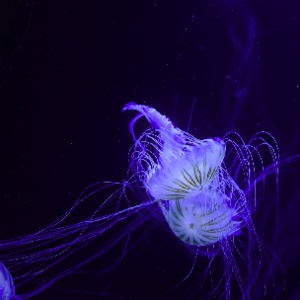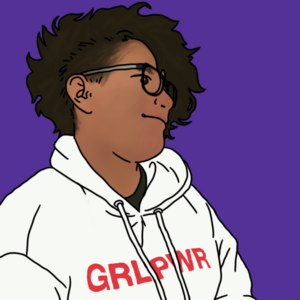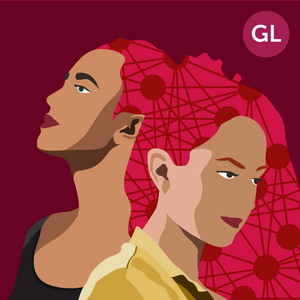== Trigger warning ==
This chapter contains: Mentions of suicide.
==================
On my way home, I made my best effort in order not to cry. I knew now that Cyan Four was listening in on me, and I didn’t want them to know I was sad and angry.
Jonathan Liam Porto was wrong. No matter how dangerous this could be, there was no freaking way I’d forget about it. For so long I had thought my father had died by suicide. So many times have I cried, trying to figure out a reason, trying to make sense of it all. Now for the first time I had reason to believe he was killed instead. It made me furious. Why would they? What kind of “dirt on Cyan” could possibly be so important that you’d take someone’s life? My father’s life! Like hell I’d forget about it.
There were two things I’ve learned from that trip. One, that “white rose” was a replica that was rejected, but not disassembled, like Helena. She might even be Helena herself, for all I know. Except that it seems this particular replica was a sensitive issue for Cyan. There was some sort of “dirt” involved, something that could make me a threat to them just by asking other people about it. It might not have anything to do to my father’s death, but that was the only lead I had, and I was damn well going to get to the bottom of that.
The other thing I’ve learned is that they were spying on me. Listening in, probably watching me with hidden cameras. I had the advantage that they didn’t seem to consider me a threat yet, but if I were to go ahead with that sort of investigation, I’d have to be extra careful about it.
The next day, at school, Abby asked me about it.
“So, how did things go with the old man?” she asked.
I measured my next words carefully, remembering the microphone inside my coat.
“They didn’t,” I told her, trying my best to sound sincere. “I had hoped he’d tell me more about my father, but he just kept saying they weren’t very close to each other. Waste of time.”
“Huh? Really?” she asked. “That’s all it was about? You just want to know more about your father? Why didn’t you ask your mother about it?”
“I did,” I told her, and it was truth, too. “Several times. But she gets sad when she talks about him, and I don’t want to see her like that. I really had hoped I would hear more about him from this Jonathan guy, you know I miss my father a lot.”
“Yeah, I know,” said Abby, sympathetically.
“Sorry I made you risk your neck for nothing,” I told her.
“It’s okay,” said Abby, “it was for a good cause.”
To be honest, I felt bad about lying to Abigail, especially after what she’d done for me. But there was no way I could tell her what I found out.
I spent three days going about my routine as if nothing was out of ordinary. In the meantime, I thought about my options. How sure was I that Cyan Four hadn’t hacked into my lens or my phone? Sixty percent? Seventy? Definitely not enough. I wasn’t an expert in security, like Abigail, but I was fairly sure none of my devices were foolproof. Just to be on the safe side, I went to a tech store on Thursday and bought myself a new lens. Then, I left my phone and old lens at home, went to one of the city squares, and used the new set to search for the information I wanted to know.
This proved harder than I had anticipated. I had wanted a list of all the replicas ever done by Cyan Four, but it seemed that this sort of information was confidential. Obviously. Why did I ever think this would be easy? So I went through all sorts of news media articles I could find, and began listing the names of all replicas I read about. Most of the articles were about Helena herself: she was the major protagonist in the Replica-Organic Equality movement. But a few other names came up, like Sofia, José and Diana, mostly people who had agreed to give interviews at some point. I had no reason to believe these people had any link with Cyan at all, least of all that any one of them was the “white rose” I was looking for. Searching for rejected replicas was even worse: nearly all the articles were about Helena. I even tried searching for “white rose” in replica-related articles, but got zero results.
I sighed. This was going nowhere. I had just spent most of my savings on a new lens for nothing. Way to go.
Maybe I should dedicate some time to learn security, like Abby did. Would it be too hard, or too dangerous, to hack into Cyan’s database? That would give me plenty of information. Except I would probably be arrested or killed if I tried, and those were outcomes I was trying to avoid.
I went home, and spent most of the evening playing with Freddie. Then, at some point, I heard my mother call me.
“Luce! Isn’t that your friend?”
I walked back into the living room. Mom was watching the news, and I found out, to my surprise, that Helena was giving a live interview. She was talking about 93/70, the law project that extended fundamental human rights and legal protections to human replicas. It was just a few weeks from being voted in congress, but the majority seemed to oppose it. “Should an air conditioner be granted human rights?” said the reporter. He was reading comments from congressmen who opposed 93/70. “Do I have to keep my refrigerator eternally plugged in now?” he read another.
Helena seemed unfazed by those comments. “People need to understand,” she said, “that replicas aren’t simple machines like a car or a refrigerator. We’re much more than that. Inside each one of us is a living being. We have human brains just like organic humans do. We feel pain, and sadness, and joy, and love. We have dreams and desires just like everyone else does. And right now I’m scared. I’m scared because there are people out there who want to shut me down, people who want me dead. I’m not asking for much, here. All I want is the right to remain alive. I want to live, and to be with the people I love. All I really want is what everyone else gets: a chance.”
The reporter was visibly uncomfortable with Helena’s response. I could understand why. In the eyes of society, replicas were robots, and robots are incapable of love. But here she was, using that word in her discourse, telling people that she could love, that she did love. I, of all people, knew that she was being completely sincere. I grew up being taught that human replicas are no different from organic humans, in terms of thoughts and feelings and such. We have similar minds: organized the same way, functioning the same way. All the neural systems organic humans had were also present in Helena and the others. Of course she could also feel love, and fear, and sadness. But that’s not how the reporter saw it, and not how most people saw it.
It made me realize what a gap there was between what I lived through, as an organic, and Helena’s experiences as a replica. She was fighting against a large section of society that didn’t care about her existence, that often did not even want her to exist at all. And they would kill her, if given a chance, which is why Helena had no choice but to fight. She probably didn’t even want to fight.
Replicas that don’t get rejected can afford to live their lives without engaging in that sort of social movement, or worrying about whether people consider replicas to be human or not. Those that do get rejected aren’t given the opportunity to talk, for they are shut down permanently by the company that replicated them. Helena was neither of these. She was probably one of the few replicas that get rejected, but not shut down, and that put her in the awkward position where she had to either battle to be legally recognized as human, or she’d eventually die in the hands of her makers. She couldn’t afford to be like the others, to not worry, and live a peaceful life in society for as long as nobody knew you were a replica. She couldn’t afford to not fight.
The interview ended a few minutes later, and I didn’t bother to watch the rest of the newsletter. I was about to go up to my room, when my mother called.
“Lucia?” she said. I stopped and looked at her. “Aren’t you going to say anything?”
“What is there to say?” I asked.
“Please tell me that you are not going out with that woman.”
I said nothing. There was a moment of silence between us, before I turned away and started to climb the steps toward my room.
“She’ll make you suffer!” my mother shouted. I didn’t care. I just went into my room and locked the door behind myself. So what if she makes me suffer? It’s my call whom I date. And if nothing changes and Helena eventually dies, it still wouldn’t be her making me suffer. It would be Cyan, and the whole of society along with it.
I tried calling Helena. It sucked to be reminded of how coldly society usually treated her, and I really wanted to hear her voice, right then. I tried three times, but she never picked up. Then I wrote her a message, asking her to call me when she was free, and laid down on my bed to think.
After five minutes, I got a message on my new lens. At first I thought it was Helena, but then I remembered that I had never even accessed my account in the new device, so it couldn’t be her, or anyone I knew.
The message came from an unidentified sender.
I know what you’re doing.
Moments later, I got a second text:
Let me help.
Along with the message, there was an untitled document.
I opened it up, and saw that it contained a list of about forty names. I went through the list, and immediately spotted Helena’s name among them, as well as the names of several other replicas that had come up when I researched them, earlier that day. Most of them were followed by a hexadecimal code, labeled an “R Code”. Others instead had the words “Rejected. Disassembled”, plus a date indicating when they had been shut down. Then there were just three which were a bit different from the others. They had the word “Rejected”, but not “Disassembled”, and they all had an “R Code” instead. Helena was among them. All of this made me think that maybe those were the ones who hadn’t been shut down after rejection.
Helena Norwood — Rejected. R Code: 0x4412AE
Rosa Alba de la Cruz — Rejected. R Code: 0x9921F3
Timothy Parker — Rejected. R Code: 0xF5A002 <dysfunctional>
I knew Helena, of course, and this Timothy Parker was likely T. P., the very first human replica to have ever been made. I knew he hadn't been shut down from what Helena had said on the day we met. There was only one other name: Rosa Alba.
The white rose.










![[Dropped] What makes you you ~ GL](https://us-a.tapas.io/sa/1b/e3a7c1ff-6a96-4108-8eec-bb6b3abdfb2d.png)

Comments (1)
See all